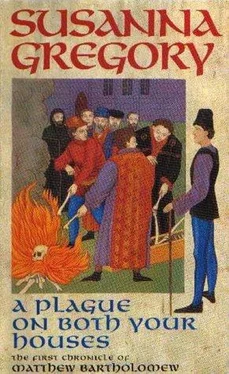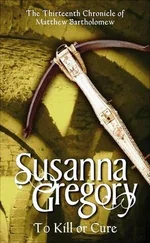Susanna Gregory - A Plague On Both Your Houses
Здесь есть возможность читать онлайн «Susanna Gregory - A Plague On Both Your Houses» весь текст электронной книги совершенно бесплатно (целиком полную версию без сокращений). В некоторых случаях можно слушать аудио, скачать через торрент в формате fb2 и присутствует краткое содержание. Жанр: Исторический детектив, на английском языке. Описание произведения, (предисловие) а так же отзывы посетителей доступны на портале библиотеки ЛибКат.
- Название:A Plague On Both Your Houses
- Автор:
- Жанр:
- Год:неизвестен
- ISBN:нет данных
- Рейтинг книги:3 / 5. Голосов: 1
-
Избранное:Добавить в избранное
- Отзывы:
-
Ваша оценка:
- 60
- 1
- 2
- 3
- 4
- 5
A Plague On Both Your Houses: краткое содержание, описание и аннотация
Предлагаем к чтению аннотацию, описание, краткое содержание или предисловие (зависит от того, что написал сам автор книги «A Plague On Both Your Houses»). Если вы не нашли необходимую информацию о книге — напишите в комментариях, мы постараемся отыскать её.
A Plague On Both Your Houses — читать онлайн бесплатно полную книгу (весь текст) целиком
Ниже представлен текст книги, разбитый по страницам. Система сохранения места последней прочитанной страницы, позволяет с удобством читать онлайн бесплатно книгу «A Plague On Both Your Houses», без необходимости каждый раз заново искать на чём Вы остановились. Поставьте закладку, и сможете в любой момент перейти на страницу, на которой закончили чтение.
Интервал:
Закладка:
Susanna Gregory
A Plague On Both Your Houses
Prologue
The scholar waited in the black shadows of the churchyard trees for the Sheriffs night patrol to pass by, trying to control his breathing. Two of the men stopped so close that he could have reached out and touched them. They stood for several minutes, leaning against the wall surrounding the churchyard, looking up and down the deserted road. The scholar held his breath until he thought he would choke. He could not be discovered now: there was so much to lose.
Eventually, the Sheriffs men left, and the scholar took several unsteady breaths, forcing himself to remain in the safety of the shadows until he was certain that they had gone. He jumped violently as a large cat stalked past his hiding place, glancing at him briefly with alert yellow eyes. He watched it sit for a moment in the middle of the road, before it disappeared up a dark alleyway.
The scholar gripped the voluminous folds of his cloak, so that he would not stumble on them, and slipped out of the trees into the road. The moon was almost full, and shed an eerie white light along the main street. He peered carefully both ways, and, satisfied that there was no one to see him, he made his way stealthily down the street towards his home.
The main gates of the College were locked, but the scholar had ensured that the little-used back door was left open. He turned from the High Street into St Michael's Lane. He was almost there.
He froze in horror as he saw someone was already in the lane: another scholar, also disobeying College rules by being out at night, was walking towards him.
Heart thumping, he ducked into a patch of tall nettles and weeds at the side of the road, in the hope that his stillness and dark cloak would keep him hidden. He heard the footsteps come closer and closer. Blood pounded in his ears, and he found he was trembling uncontrollably. The footsteps were almost level with him. Now he would be uncovered and dragged from his hiding place!
He almost cried in relief as the footfall passed him by, and faded as his colleague turned the corner into the High Street. He stood shakily, oblivious to the stinging of the nettles on his bare hands, and ran to the back gate. Once inside, he barred it with unsteady hands, and made his way to the kitchens. Faint with relief, he sank down next to the embers of the cooking fire and waited until his trembling had ceased. As he prepared to return to his room to sleep away what little remained of the night, he wondered how many more such trips he might make before he was seen.
Several hours later, the Bishop's Miller dragged himself from his bed, tugged on his boots, and set off to his work. The sky was beginning to turn from dark blue to silver in the east, and the miller shivered in the crispness of the early morning. He unlocked the door to the building and then went to feed the fat pony that he kept to carry flour to the town.
A short distance away, he could hear the rhythmic whine and swish of the water-wheel, powered by a fast-running channel diverted from the river. The miller had grown so familiar with its sound that he never noticed it unless there was something wrong.
And there was something wrong this morning. There was an additional thump in the rhythm.
The miller sighed irritably. Only the previous week he had been forced to ask the help of his neighbours to free the branch of a tree that had entangled itself in the wheel, and he was loathe to impose on their good graces again so soon. He tossed some oats to the pony, and, wiping his hands on his tunic, he went to investigate.
As he drew nearer, he frowned in puzzlement. It did not sound like a branch had been caught, but something soggier and less rigid. He rounded the corner and approached the great wheel, creaking and pounding as the water roared past it.
He felt his knees turn to jelly as he saw the wheel and what was caught in it, and sank onto the grass, unable to tear his eyes away. The body of a man was impaled there, black robes flapping wetly around him as the wheel dragged him under the water again and again.
As the wheel lifted the body, one arm flopped loose in a ghostly parody of a wave, which continued until the body dived, feet first, back into the water for another cycle. The horrified miller watched the body salute him three times before he was able to scramble to his feet and race towards the town screaming for help.
1
The dull thud of horses' hooves and the gentle patter of rain on the wooden coffin were the only sounds to disturb the silence of the dawn.
Black-gowned scholars walked slowly in single file along the High Street, following the funeral cart past the town gate to the fields beyond, where the body of their Master, Sir John Babington, would be laid in its final resting place.
Somewhere behind him, Matthew Bartholomew heard one of the students stifle a giggle. He turned round and scowled in the general direction of the offending noise.
Nerves, doubtless, he thought, for it was not every day that the College buried a Master who had taken his own life in such a bizarre manner.
The small procession was allowed through the gate by sleepy night-watchmen who came to the door of their guardroom to look. One of them furtively nudged the other and both smirked. Bartholomew took a step towards them, but felt Brother Michael's restraining hand on his shoulder. Michael was right; it would be wrong to turn Sir John's funeral into a brawl. Bartholomew brought his anger under control. Sir John had been one of the few men in the University who had been liked by the townspeople, but they had been quick to turn against him once the manner of his death became known. Had Sir John died a natural death, he would have been buried in the small churchyard of St Michael's, and been given a glorious funeral. Instead, church law decreed that, as a suicide, he should be buried in unconsecrated ground, and be denied any religious ceremony. So, in the first grey light of day, Sir John was escorted out of the city by the scholars of Michaelhouse, to be laid to rest in the waterlogged fields behind the church of St Peter-without-Trumpington Gate.
The horse pulling the cart bearing the coffin stumbled in the mud, causing the cart to lurch precariously. Bartholomew sprang forward to steady it, and was surprised to see Thomas Wilson, the man most likely to be Sir John's successor, do the same. The eyes of the two men met for an instant, and Wilson favoured Bartholomew with one of his small pious smiles. Bartholomew looked away. No love had been lost between the smug, self-satisfied Wilson and Sir John, and it galled Bartholomew to watch Wilson supervise Sir John's meagre funeral arrangements. He took a deep breath, and tried not to think how much he would miss Sir John's gentle humour and sensible rule.
Wilson gave an imperious wave of a flabby white hand, and Bartholomew's book-bearer, Cynric ap Huwydd, hurried forward to help the ostler lead the horse off the road and across the rough land to the grave site.
The cart swayed and tipped, and the coffin bounced, landing with a hollow thump. Wilson seized Cynric's shoulder angrily, berating him for being careless in a loud, penetrating whisper.
Bartholomew had had enough. Motioning to the other Fellows, he edged Sir John's coffin from the cart, and together they lifted it onto their shoulders. They began the long walk across the fields to where the grave had been dug in a ring of sturdy oak trees. Bartholomew had chosen the spot because he knew Sir John had liked to read in the shade of the trees in the summer, but he began to doubt his choice as the heavy wood cut into his shoulder and his arms began to ache. After a few minutes, he felt himself being nudged aside, and smiled gratefully as the students came forward to take their turn.
Читать дальшеИнтервал:
Закладка:
Похожие книги на «A Plague On Both Your Houses»
Представляем Вашему вниманию похожие книги на «A Plague On Both Your Houses» списком для выбора. Мы отобрали схожую по названию и смыслу литературу в надежде предоставить читателям больше вариантов отыскать новые, интересные, ещё непрочитанные произведения.
Обсуждение, отзывы о книге «A Plague On Both Your Houses» и просто собственные мнения читателей. Оставьте ваши комментарии, напишите, что Вы думаете о произведении, его смысле или главных героях. Укажите что конкретно понравилось, а что нет, и почему Вы так считаете.












